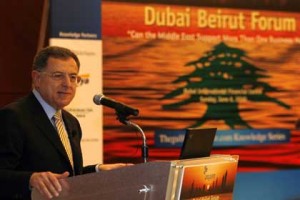 Lebanon’s former PM and Al Mustaqbal MP Fouad Siniora urged the Lebanese government to take the issue of offshore gas reserves in the Lebanese territorial waters very seriously.
Lebanon’s former PM and Al Mustaqbal MP Fouad Siniora urged the Lebanese government to take the issue of offshore gas reserves in the Lebanese territorial waters very seriously.
Siniora , who is attending the Dubai – Beirut Forum also said Saturday the issue was not new and that he had followed it up when he was finance minister and a premier.
Siniora cautioned that a lot of effort is required to reach the point of exploring the reserves.
During a press conference Lebanese Speaker Nabih Berri said last Wednesday that he presented a full report on the need to drill for natural resources along Lebanon’s coastline at the last dialogue session.
“A Norwegian company recently estimated 220 trillion cubic feet of gas in Lebanon’s waters, in addition to 308 million barrels of oil,” Berri said.
Berri warned that Israel planned to lay claim to the prospective resources.
“Israel is racing to make the case a fait accompli and was quick to present itself as an oil emirate, ignoring the fact that, according to the maps, the deposit extends into Lebanese waters,” Berri said.
In a related development Hezbollah’s Executive Council Chief Hashem Safieddine said on Saturday that the movement would not allow Israel to loot Lebanese gas resources.
Siniora urges better inter Arab cooperation
Siniora had some strong words for his counterparts in the other Arab countries. He called for better use of capital within the region.
“There are countries [in the Middle East] that are rich in capital, while others have other comparative advantages but are in great need of capital financing to develop their essential infrastructure and invest in their productive capacity,” he said.
Siniora added: “Countries that are rich in capital are investing in the Western world and suffering every now and then significant losses due to financial crises that are not of their own making. Meanwhile, countries in need of capital borrow at rates that are also high for reasons that are also not necessarily of their own making.”
Siniora urged Siniora better economic cooperation between Arab states.
“There is a need for the rise of institutions that can support the channeling process, whereby capital is directly provided from the capital-rich Arab country to the capital-deprived Arab country, short-cutting the international capital markets,” he says. “Only when stronger economic ties, higher trade volumes and synergies in capital, resources and human skills are truly established in the region can we then really talk about a financial center — or many financial centers— that are serving a real economic function, and that complement rather than compete with others.”
Siniora added: “Before people even started using the phrase, Lebanon was always known to be a knowledge economy.”
Siniora concluded: “No-one can really claim that Lebanon has the wealth that is present in some parts of the Arab world, or the developed infrastructure available elsewhere in the region. But we have a large number of high-level universities and a highly competitive environment sparked by the very open nature of Lebanese businesses and people. We need to improve our educational system at the primary, secondary and at the university level. Our democracy and high degree of freedom are the factors that make our small nation big on the international stage, and open and tolerant as well.”

Leave a Reply
You must be logged in to post a comment.